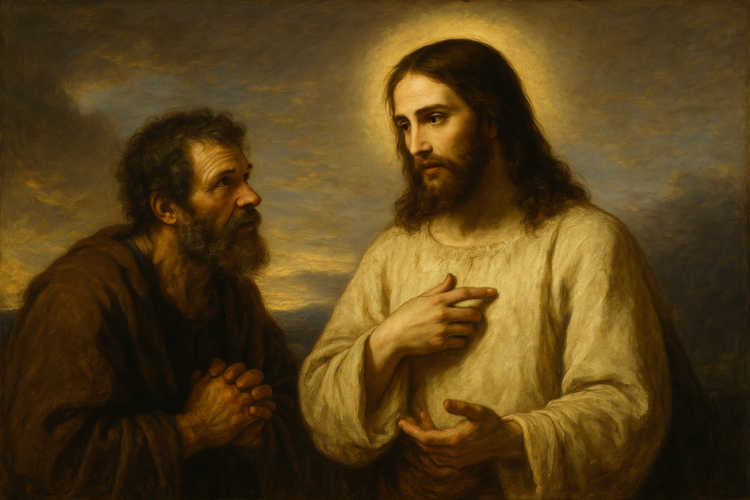Built to Bear It

I’m going to tell you something that should not be a revelation – you must carry your cross. In Genesis, we find the “jerk who invented work” (or, rather, necessitated Work and distorted it into the “labor” that it is). I have sat through many a sermon extolling the virtues of earning a living by the sweat of one’s brow, of the “Protestant Work Ethic”, and I have sat through a few homilies reminding men that it is our lot to carry our crosses with patience, to endure the hardships and trials of the world because “suffering is redemptive”. And while there’s truth and wisdom in those approaches, I always found them to be somewhat lacking.
As men, we know intuitively that work, of some description, is a reality. We know that (for most of us) being a husband and a father is our vocation, and we do not need to be told how serious and important those roles are. The truth is, we feel the weight of these responsibilities every day. Even if we try to ignore it or drown it out, that man-shaped Cross is on our backs. The only choice we get, our only say in
the matter, is this: Will we carry it with dignity or drag it in resentment?
Most men start out strong- we love our wives and being their husbands, we love our children and being their father. We may not love our jobs or our bosses, but we take them seriously and we show up. Until months turn into years and, suddenly, we realize we resent the Cross. We resent its weight, its imposition, its insistence, its constant pressure. Unfortunately, the world (and, too often, the Church)
simply expects us to “man up”, to be tough, to go on without complaint or asking for help, much less acknowledgment or empathy. I will tell you what happens when that resentment boils over, when Pride finally reigns as king in the place meant for Christ and His Passion. It is Golgotha without the Resurrection.
Cowardice - one of Pride’s many children – sees the Cross and declares “It is too costly.” It is to see “the better part” and say, “My way is better.” It is when I first forget my brother’s needs, and then despise him for being needy. It is when I allow self-preservation to become so disordered and unchecked that even the thought of sacrifices, of personal discomforts, of inconveniences, no matter how slight, cannot
be tolerated. Cowardice is the unseen force that tricks us into believing aggression and violence are authentic displays of masculinity, and that dominance and headship mean squishing others down so we may appear larger and more powerful than we are. It is the impetus of Judas’ betrayal, but even more so it is his inability, his refusal, to repent. It is the echo of, “I will not serve”. John’s Apocalypse tells us
that the lot of cowards (amongst others) is the burning lake of fire. Let us be clear – you cannot be a coward and live; not in this life, and certainly not in the next.
“Biblical manhood” is a theme that’s been done to death, and the last thing I want to do here is reinvent the wheel. I am someone who struggled with my masculinity in early adulthood because people who I thought cared about me, and knew better than I, told me I was the “wrong kind” of man. I spent years tearing down and building new versions of myself trying to fit into a man-shaped mold someone else
had imagined. In my desire to please and my personal conviction to always be better, I tried to become something I wasn’t and ultimately wound up more lost and more confused than when I started. It was not until I framed and anchored my masculinity at the foot of the Cross that being a father, a husband, a provider-a “Biblical man”- made sense.
Hear me when I say, I know how heavy this Cross can feel. I know because I grew to resent it, and I increased its weight by refusing to accept it. When Genesis tells us that we men must labor, it isn’t just in the field or factory or office- it is on the spiritual battlefield, both with ourselves and against the Devil. The Devil will attack you. Your sins will need to be answered for. Scripture could not be
clearer. Christ offers no other path save the one leading to the Cross. Like it or not, you’re headed toward your own Golgotha right now, if for no other reason than how God fearfully and wonderfully made you. When Christ tells us that He came so that we may have abundant life (John 10:10), He isn’t speaking only of Salvation; He’s asserting that this abundance is to be had under the weight of the Cross,
and possibly because, not in spite, of it. The voice of Cowardice is partly right – these are costly things. To deny yourself, to die to yourself- these could have been romantic spiritual axioms, were it not for the fact that the man who gave them to us died brutally, naked and alone. Yet the Cross and the Crucified issues forth a call that penetrates the sniveling voice of Cowardice, that does not shout but whispers in a still, small voice, “I, too, carried it. Be not afraid. It is costly- see what it cost me- but you were built to bear it.” We are Easter people, to be sure, and praise God for it, but we must be Cruciform Men. For as there can be no Easter Sunday without Good Friday, there is no authentic masculinity without embracing the road and the tool by which our Salvation was worked out.
So rise with Christ,place your shoulder against the wood and plant your feet firmly, and be what He has called you to be.


Member discussion